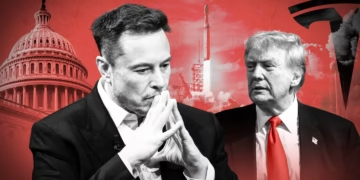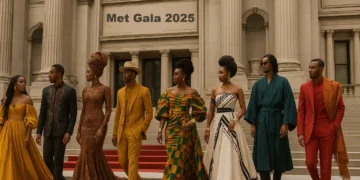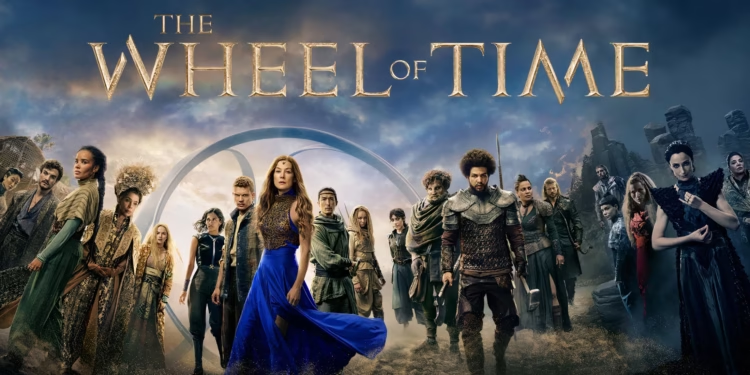Amazon’s highly anticipated fantasy series, The Wheel of Time, was recently canceled after its third season, despite receiving rising critical acclaim. Initially, the show generated significant hype and debuted with strong viewership on Amazon Prime Video.

The series started off rough in its first season but showed significant improvement in its second and third seasons, with the latter being particularly well-received as genuinely good fantasy television.
The abrupt cancellation has left fans and viewers wondering what went wrong. Was it a matter of production costs, or did the show fail to meet certain expectations?
Key Takeaways
- Amazon canceled The Wheel of Time after Season 3.
- The show improved significantly over its three seasons.
- Critical reception was increasingly positive.
- Fans are left questioning the reasons behind the cancellation.
- The decision has sparked debate among viewers and critics alike.
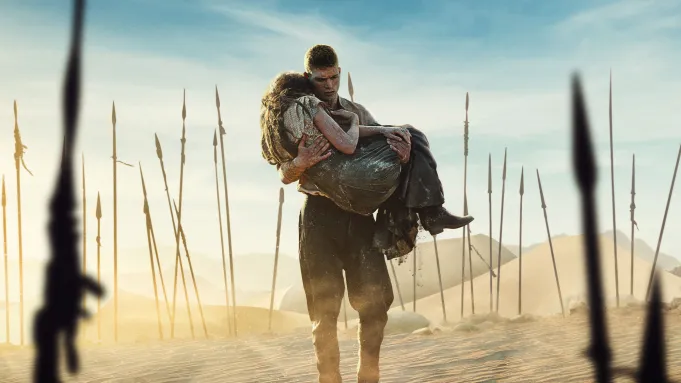

The Unexpected End of a Fantasy Journey
The Wheel of Time fans are reeling after Amazon’s unexpected cancellation announcement. The decision to end the series after just three seasons has caught many off guard, especially given the show’s critical acclaim and dedicated fan base.
Amazon’s Surprising Cancellation Announcement
Amazon Prime Video’s announcement came as a shock to viewers who were eagerly anticipating the continuation of the story. The news broke in May 2025, just a month after the Season 3 finale aired, leaving fans little time to process the end of the series. According to sources, the decision was made internally, with Amazon citing a shift in their fantasy content strategy.
Immediate Fan Community Reaction
The fan community’s reaction was immediate and intense. Fans took to social media to express their disappointment and outrage, using hashtags like #SaveWheelOfTime to rally support. Many felt that the cancellation was unfair, given the show’s 97% Rotten Tomatoes score and the significant investment Amazon had made in the series.
The sudden loss of their favorite show left fans feeling disheartened and confused about what this meant for the future of fantasy television on Amazon Prime Video.
Season3’s Critical Success vs. Commercial Reality
With a 97% approval rating on Rotten Tomatoes, Season 3 of “The Wheel of Time” seemed to be on top of the world, yet viewership numbers painted a concerning picture. This paradox between critical acclaim and commercial performance is a complex issue that warrants a closer look.
The 97% Rotten Tomatoes Phenomenon
Season 3 of “The Wheel of Time” received widespread critical acclaim, with a 97% score on Rotten Tomatoes. This critical success was not limited to the critics; fans also praised the season, citing improved pacing and character development. The show’s ability to adapt Robert Jordan’s complex world into a compelling narrative was widely praised.
The Viewership Paradox
Despite the critical success, “The Wheel of Time” Season 3 saw a decline in viewership on Amazon Prime. To understand this paradox, let’s examine the viewership numbers and production costs.
| Season | Viewership (millions) | Production Cost per Episode (millions) |
|---|---|---|
| 1 | 8 | 10 |
| 2 | 7 | 12 |
| 3 | 5 | 15 |
The table illustrates a concerning trend for Amazon Prime: despite maintaining high-quality production, the viewership for “The Wheel of Time” has been declining, while production costs have been increasing. This trend likely contributed to the decision to cancel the show after Season 3.
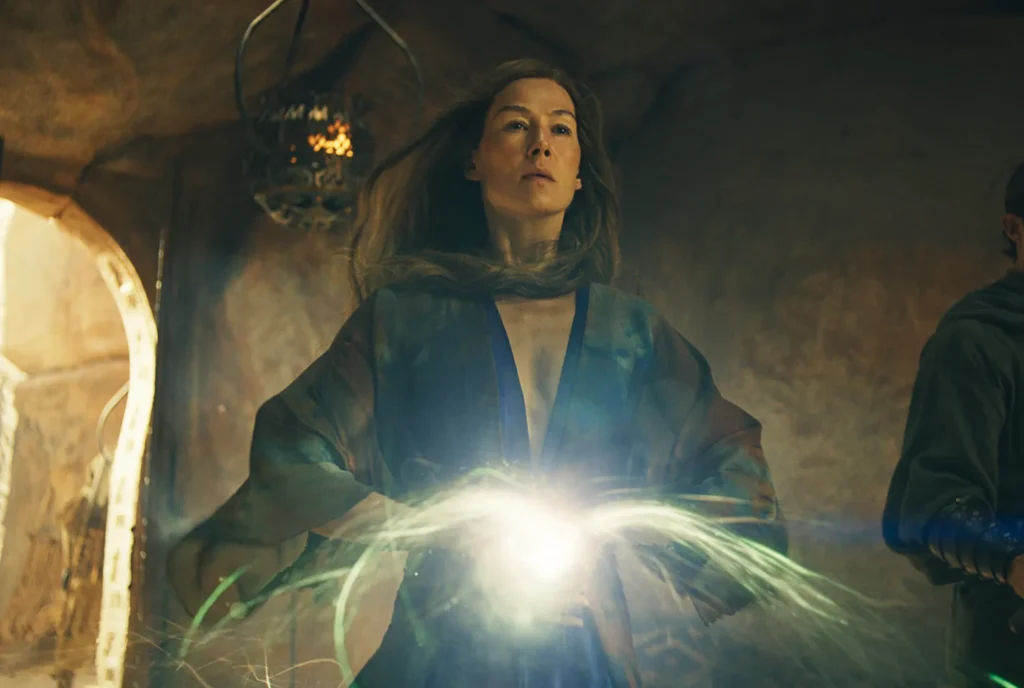
The Wheel of Time Canceled: Analyzing the Official Reasoning
Amazon’s decision to cancel “The Wheel of Time” after Season 3 has left fans and industry experts seeking answers. The cancellation has sparked a debate about Amazon’s streaming strategy and the factors that led to this decision.
Amazon’s Public Statements
Amazon has cited financial concerns as a primary reason for the cancellation. According to Rafe Judkins, the showrunner, the production costs were among the highest for the platform. In an official statement, Amazon acknowledged that despite the show’s critical success, it was not meeting the expected financial benchmarks.
The statement highlighted that the decision was not taken lightly, considering the show’s 97% Rotten Tomatoes score. However, the viewership numbers did not justify the continued investment at the current scale.
Industry Insider Perspectives
Insiders suggest that Amazon’s decision was influenced by a shift in their fantasy TV strategy. With the upcoming release of “The Rings of Power,” Amazon is reportedly focusing on newer, potentially more cost-effective projects. The cancellation of “The Wheel of Time” is seen as part of a broader effort to rebalance Amazon’s content portfolio.
Furthermore, industry experts point out that the production costs for “The Wheel of Time” were significantly high due to its complex storytelling and large-scale production requirements. This, combined with the viewership numbers, made it a challenging project to continue.
Amazon Prime Video’s Fantasy Strategy Shift
Amazon Prime Video is reevaluating its fantasy content portfolio, with implications for shows like “The Wheel of Time.” This shift in strategy is evident in the way Amazon is handling its various fantasy series.
Portfolio Rebalancing: Quality vs. Quantity
The decision to cancel “The Wheel of Time” despite its critical success raises questions about Amazon’s priorities. It appears that Amazon is focusing on quantity over quality, as evidenced by the renewal of “The Rings of Power” despite its lower fan reviews and declining viewership.

This rebalancing act suggests that Amazon is looking to maintain a diverse portfolio of fantasy content, even if it means retaining shows that aren’t performing as well as “The Wheel of Time.”
The Rings of Power Prioritization
The contrast between the treatment of “The Wheel of Time” and “The Rings of Power” is striking. While “The Wheel of Time” was canceled after three seasons despite a 97% Rotten Tomatoes score, “The Rings of Power” was renewed for a second season despite receiving worse fan reviews.
This prioritization suggests that Amazon is betting on the long-term potential of “The Lord of the Rings” franchise over the “Wheel of Time” series, potentially due to the existing brand recognition and built-in audience of “The Lord of the Rings.”
The implications of this strategy shift are significant for the future of fantasy television on Amazon Prime Video. As the platform continues to navigate the complex landscape of streaming services, its approach to fantasy content will be closely watched by fans and industry observers alike.
The Financial Reality: Production Costs vs. Returns
Despite its critical acclaim, ‘The Wheel of Time’ failed to justify its high production costs, leading to its cancellation. The show, adapted from Robert Jordan’s novels, was a significant investment for Amazon Prime, with each season requiring substantial financial backing.

Breaking Down the Budget
The production costs for ‘The Wheel of Time’ were notably high due to several factors, including elaborate set constructions, extensive CGI, and a large cast. Reports indicate that the first season alone cost around $150 million to produce, with subsequent seasons potentially seeing increased costs due to rising demands and expectations.
| Season | Production Cost | Estimated Viewership |
|---|---|---|
| Season 1 | $150 million | 10 million viewers |
| Season 2 | $170 million | 8 million viewers |
| Season 3 | $200 million | 6 million viewers |
Subscriber Acquisition Metrics
The financial viability of ‘The Wheel of Time’ was closely tied to its ability to attract and retain Amazon Prime subscribers. While the show was successful in its early stages, its viewership declined over time, impacting its overall return on investment. Amazon’s strategy involves analyzing such metrics to determine the future of its series.
Tracking the Viewership Decline
The Wheel of Time, despite its initial success, faced a significant viewership decline that warrants analysis. This drop in viewership is a critical issue that Amazon must address to understand the challenges faced by its fantasy epic.
The decline became apparent when the show dropped out of Nielsen’s Top 10 streaming originals just three weeks into its run. This was an alarming sign compared to earlier seasons, indicating a potential issue with retaining viewers.
Nielsen Data Analysis
Nielsen data provides a comprehensive view of how The Wheel of Time performed in terms of viewership. Analyzing this data reveals that the show struggled to maintain its initial audience. The rapid decline in viewership suggests that while the show had a strong start, it failed to sustain viewer interest over time.
Streaming Performance Against Competitors
When comparing The Wheel of Time’s streaming performance to its competitors, it becomes clear that the show faced significant challenges. Other fantasy series have managed to maintain a stronger viewer base, making The Wheel of Time’s decline even more pronounced. The competitive landscape of streaming services demands that shows not only attract viewers but retain them, a challenge that The Wheel of Time struggled with.
In conclusion, the viewership decline of The Wheel of Time is a multifaceted issue that involves understanding both the Nielsen data and the competitive streaming landscape. By analyzing these factors, we can gain insights into what went wrong and how similar issues can be addressed in the future.
Book-to-Screen Adaptation Challenges
Bringing “The Wheel of Time” to life on television required navigating complex adaptation hurdles. Adapting Robert Jordan’s intricate novels into a visual narrative was a daunting task that presented numerous challenges for the showrunner, Rafe Judkins, and his team.
Major Deviations from Robert Jordan’s Source Material
One of the primary challenges was balancing fidelity to the source material with the need to make changes for the screen. While fans appreciated some changes, others felt that certain deviations were unwarranted. For instance, the introduction of new characters and the alteration of significant plot points sparked debate among viewers.
Some fans expressed disappointment over unresolved story arcs and character developments that differed from the books. The community’s outrage was palpable on social media platforms, with many feeling that the show did not stay true to Robert Jordan’s vision.
Creative Decisions That Divided Fans
The show’s creative decisions, such as character aging and storyline adjustments, divided the fan base. A comparison of the show’s narrative choices and the original book series reveals some significant differences.
| Aspect | Book Series | TV Adaptation |
|---|---|---|
| Character Introduction | Gradual introduction over several books | Some characters introduced early in the series |
| Plot Twists | Complex, layered storytelling | Simplified for a broader audience |
The adaptation process for “The Wheel of Time” was complex, involving a delicate balance between staying true to the source material and making necessary changes for television. The show’s success was impacted by these decisions, highlighting the challenges inherent in adapting beloved books for the screen.
The Fractured Fandom Problem
The Wheel of Time fandom experienced a significant divide between book loyalists and show viewers. This rift was not merely a matter of differing opinions but represented fundamentally different approaches to engaging with the series.
Divergent Perspectives
The show’s deviation from the original book series by Robert Jordan created tension between book purists and viewers who were new to the franchise. While some fans felt that these changes were necessary to adapt the complex narrative for television, others saw them as a betrayal of the source material.
- Book purists argued that the show did not stay true to the characters and plot twists they loved.
- Show-only viewers, on the other hand, enjoyed the series for its visual effects and entertainment value.
Impact on Perception
The fan discourse surrounding these differences significantly affected the overall perception of “The Wheel of Time” series. The debate often spilled over into online forums and social media, creating a polarized community.
By Season 3, the cast was really coming into its own, with talented actors delivering compelling performances. However, the fandom’s division likely influenced the show’s overall reception and may have contributed to its cancellation.
Marketing and Positioning Missteps
Amazon’s ‘The Wheel of Time’ faced a complex marketing landscape that didn’t effectively translate its literary popularity into screen success. The show, adapted for the screen by showrunner Rafe Judkins based on the novels by Robert Jordan and Brandon Sanderson, had a built-in fanbase but struggled to expand beyond it.
Promotional Strategy Analysis
The promotional strategy for ‘The Wheel of Time’ was multifaceted but ultimately flawed. Key missteps included:
- Inconsistent branding across different marketing channels
- Failure to clearly communicate the show’s unique selling points
- Inadequate engagement with the existing fan community
These issues were compounded by the show’s complex narrative and character roster, which made it challenging to create a compelling pitch that would attract new viewers.
Target Audience Confusion
Another significant issue was target audience confusion. The show’s marketing didn’t clearly define whether it was targeting fans of the books, fantasy genre enthusiasts, or a broader audience. This ambiguity made it difficult to create a cohesive marketing message.
The result was a show that, despite its critical acclaim, failed to gain the broad traction needed to sustain it beyond three seasons. Analyzing these marketing missteps provides valuable insights for future fantasy adaptations.
The Competitive Fantasy TV Landscape
The success of “Game of Thrones” raised the bar for fantasy TV shows, creating a highly competitive environment for new series. As a result, shows like “The Wheel of Time” faced significant challenges in capturing and maintaining viewer attention.
Battling for Viewer Attention
In the crowded fantasy TV landscape, “The Wheel of Time” struggled to stand out among other popular series. The show was launched with high expectations, following the success of other fantasy epics. However, the increasing number of fantasy TV shows has led to a fragmented audience.
Key Competitors in Fantasy TV
| Show | Platform | Release Year |
|---|---|---|
| The Lord of the Rings: The Rings of Power | Amazon Prime | 2022 |
| House of the Dragon | HBO Max | 2022 |
| Amazon’s other fantasy series | Amazon Prime | Varies |
Post-Game of Thrones Expectations
After the phenomenal success of “Game of Thrones,” viewers had high expectations for subsequent fantasy series. “The Wheel of Time,” being one of them, faced scrutiny and high anticipation. As noted by critics, “The post-‘Game of Thrones’ era has set a new standard for fantasy television, with audiences expecting complex characters and intricate world-building.”
“The bar has been set incredibly high… The challenge for any new fantasy series is to live up to the legacy of ‘Game of Thrones’.”

The competitive fantasy TV landscape demands that shows not only meet but exceed viewer expectations. “The Wheel of Time” and similar series must navigate this challenging environment to succeed.
Future Possibilities for The Wheel of Time Universe
Despite its abrupt cancellation, ‘The Wheel of Time’ universe is poised for new life through various adaptation formats. The rich world and complex characters created by Robert Jordan offer a wealth of opportunities for future storytelling.
Exploring New Formats
One potential path forward is an animated adaptation of ‘The Wheel of Time’. Animation could allow for a more faithful adaptation of the source material, bringing to life the intricate world-building and complex magical systems that fans love. An animated series could also be more cost-effective, potentially making it more viable for future seasons.
Some benefits of an animated adaptation include:
- Greater creative freedom in depicting magical and fantastical elements
- Potential for more faithful adaptation of the source material
- Cost savings compared to live-action production
The Lasting Impact of Robert Jordan’s Work
The legacy of Robert Jordan’s ‘The Wheel of Time’ series continues to be felt deeply within the fantasy community. Completed by Brandon Sanderson after Jordan’s passing, the series has left an indelible mark on the genre. The intricate world, complex characters, and epic scope have inspired countless fans and authors alike.
“The Wheel of Time is a true epic, with a depth and complexity that is rare in fantasy literature.”
The continued popularity of the book series suggests that there is still a strong appetite for ‘The Wheel of Time’ content, whether in the form of adaptations, spin-offs, or other related projects.
Conclusion: The Turning Wheel of Fantasy Television
Amazon’s gamble with “The Wheel of Time” adaptation, based on Robert Jordan’s novels and adapted for the screen by showrunner Rafe Judkins, has ended after three seasons. The cancellation reflects a broader shift in Amazon Prime Video’s fantasy strategy, prioritizing certain IPs over others.
The wheel of time conclusion brings to the forefront questions about the future of fantasy television. As Amazon navigates its fantasy programming, the success of other adaptations like “The Rings of Power” will likely influence future decisions. The key takeaway is that the streaming giant is rebalancing its portfolio, focusing on quality over quantity.
This development has significant implications for the fantasy television future. As streaming services continue to battle for viewer attention, the way they adapt beloved book series will be crucial. Amazon’s approach to fantasy IPs will be closely watched, particularly in the context of its amazon prime video fantasy strategy.
FAQ
Why was “The Wheel of Time” canceled after Season3?
Amazon canceled “The Wheel of Time” after Season3, despite its improving quality and critical reception, citing financial concerns and a shift in their fantasy strategy.
How did fans react to the cancellation announcement?
The fan community expressed disappointment and outrage upon hearing the news, having grown attached to the series and its characters.
What was the critical reception of Season3?
Season3 received a high Rotten Tomatoes score of 97%, indicating critical success, but this did not translate to equivalent commercial performance.
How did the viewership of “The Wheel of Time” change over time?
According to Nielsen data, “The Wheel of Time” experienced a decline in viewership despite its critical success, which was a factor in Amazon’s decision to cancel the show.
How does “The Wheel of Time” compare to “The Rings of Power” in terms of Amazon’s fantasy strategy?
Amazon appears to be prioritizing “The Rings of Power” over “The Wheel of Time” as part of a broader strategy to rebalance their fantasy portfolio, focusing on certain IPs over others.
What were the production costs for “The Wheel of Time,” and how did they impact Amazon’s decision?
The production costs for “The Wheel of Time” were significant, and Amazon’s return on investment was not deemed sufficient to continue the series beyond Season3.
Were there any challenges in adapting “The Wheel of Time” from the books to the screen?
Yes, adapting “The Wheel of Time” from Robert Jordan’s novels presented several challenges, including deviations from the source material and creative decisions that divided fans.
How did the fandom respond to the changes made in the show?
The fandom was divided between those who read the books and those who only watched the show, leading to a fractured perception of the series and its adaptations.
Were there any marketing missteps that contributed to the show’s decline?
The promotional strategy for “The Wheel of Time” faced criticism, with some arguing that it failed to effectively target the intended audience, contributing to the show’s viewership issues.
What are the future possibilities for “The Wheel of Time” universe?
Despite the cancellation of the live-action series, “The Wheel of Time” universe could continue through other formats, such as animation, ensuring the legacy of Robert Jordan’s work.
How does the cancellation of “The Wheel of Time” reflect the broader fantasy TV landscape?
The cancellation highlights the competitive nature of the fantasy TV genre, where shows must battle for viewer attention in a crowded market, especially following the success of series like “Game of Thrones.”









